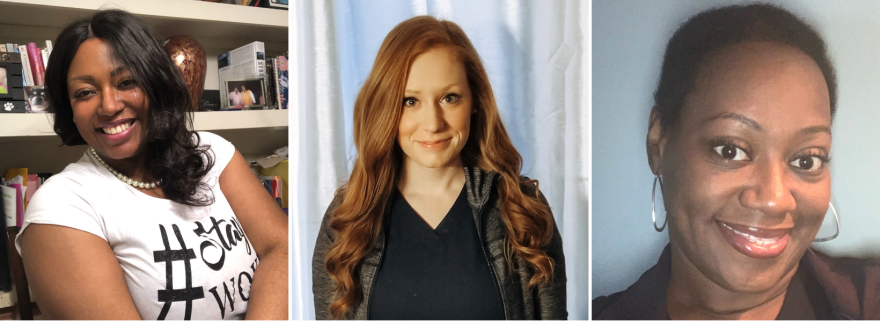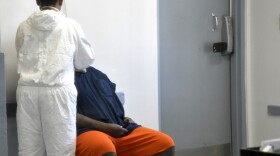More information is coming out about the potential long term symptoms of COVID-19. The CDC recently put out a list of the long term effects of the virus. And post-COVID treatment centers are growing in number.
It’s being called “Long COVID.” For people living with it, there are a lot of unknowns. They’re also navigating a health care system that isn’t always supportive.
The other day, Heather-Elizabeth Brown was talking to her mom about what kind of dog she wanted, but she couldn’t get the words out. "I just could not remember the breed," said Brown.
Brown has always prided herself on being an efficient communicator. So when she couldn’t remember the word “Chihuahua,” it was frustrating.
Brown got COVID back in April and she was put on a ventilator. Nine months later, she’s still facing lingering symptoms. Along with brain fog, there’s shortness of breath and fatigue.
The Michigan COVID-19 Recovery Surveillance Study showed that one in four people with confirmed COVID had not recovered to their normal state of health 10 to 29 weeks after their initial diagnosis.
A lot of people with Long COVID are young - in their 20s, 30s and 40s with no underlying health conditions. Brown is just 35. She’s part of a whole new group of people that needs to interact with the health care system in a way that they've never needed to before.
Not only is there little information about Long COVID, but long haulers are also grappling with the reality that who we are affects the care we receive.
Take Brown: after she got off the ventilator and returned back home, she had extreme pain in her leg. It was swollen and red, and she couldn’t put any weight on it. The medical professionals around her dismissed it.
"I was trying to trust in the people that I thought knew better," said Brown. "It just got to a point where I said, OK, you're wrong."
She went to the emergency room. Turns out she had three blood clots in her leg. She could have died. To Brown it was a moment of medical gaslighting, which happens when people’s real health concerns are downplayed or dismissed. Why gaslighting happens isn't always clear. Brown thought maybe her medical record played a role or maybe it was her age.
"Maybe they thought that I was being overly dramatic as a woman," Brown said.
"Patient-Reported Experiences of Discrimination in the US Health Care System," a recent study published in JAMA Network Open, estimates that 21% of adults in the United States who seek medical care have experienced some kind of discrimination.
Racial discrimination was the most frequently reported.
"Discrimination can happen all along many different identity axes," said Dr. Melissa Creary, one of the four co-authors of the paper. "When we're talking about COVID-19...certainly we have to consider the ways in which racism really does undergird the structural and systemic equity opportunities for people of color in this country."
The other most reported lines of discrimination were based on education, income, weight, sex, and age.
"All of these things...absolutely affect how one may get treated or mistreated in the health care setting," said Creary.
It’s not always clear what discrimination looks like in a health care setting. It can look like a long wait time or an assumption that you're healthy because you’re young. Or maybe lack of understanding if you’re uninsured.
Are you not getting the care you need because of what identities you hold? Or is it just that the doctor was busy?
Suzanna McLeskey thinks it’s probably a combination of factors. She’s a long hauler, too. McLeskey is a mother of a one year old and a nurse. Although she can’t work right now because of her health.
At one point she went to the emergency room 10 times in two weeks. Her medical knowledge really helped her advocate for what she needed.
Even so, there are still some doctors who don’t hear her exactly. One time when she landed in the emergency room with a fast heart rate. The medical staff suggested it was anxiety and gave her a Xanax.
“I feel like some doctors try to play it around the other way,” said McLeskey. “Like your anxiety is causing these symptoms. When really it's like, no, I feel anxious because I've never felt like this in my life and that is why.”
When the people around you don’t believe in your symptoms, it can cause some doubt in yourself. That’s the case for Tashuna Jones.
“Sometimes you do start thinking like, am I making this up in my mind?” said Jones.
Jones is another long hauler. She got COVID and was put on a ventilator. She’s since lost her job because of needing to miss work. And recently Jones has been getting the sense that her doctors may not be fully hearing her.
“I can tell now it's more so like, OK, it's been X amount of months, so maybe could you be making this up?” she said. “Maybe you're tired because you're at home every day now. You're not working.”
And it hurts to feel this. Not just from medical professionals but from other people in her life, too.
“You start to feel like people are doubting you. What am I gaining to say that I'm still sick, I'm still tired?”
Brown, McLeskey and Jones aren’t quick to name discrimination as to why getting care has been difficult. There are a lot of factors at play.
And for the most part they seem appreciative of their doctors, especially the ones who believe them. The reality is, not everyone gets the care they need. Some of that is because of big, institutional problems. Some of it is how we relate to one another, person-to-person. And with that there’s a kind of opportunity.
“I think that it is so important to raise awareness about how people are affected, about how communities are affected,” said Heather-Elizabeth Brown. “How minorities and Black and Indigenous people of color are affected, how women are affected, how differently abled people are affected. There are so many different communities who need visibility, who need advocacy...and we’re going to have a lot of work to do moving forward.”
There’s a version of this story that ends here. With long haulers navigating the health care system for symptoms that don’t have clear answers.
But the story doesn’t end here, because Heather-Elizabeth Brown, Tashuna Jones, and Suzanna McLeskey are just three of the thousands of people with Long COVID banding together.
There are support groups on Facebook, Twitter, and Slack. There are patient-led surveys and story sharing. Folks share advice on how to talk to their doctors. How to advocate for themselves.
And since one in four people who've had COVID are dealing with lasting symptoms, some people are calling it a movement.
[For more Michigan news right on your phone, subscribe to the Stateside podcast on Apple Podcasts or Google Podcasts today]
Want to support reporting like this? Consider making a gift to Michigan Radio today.









